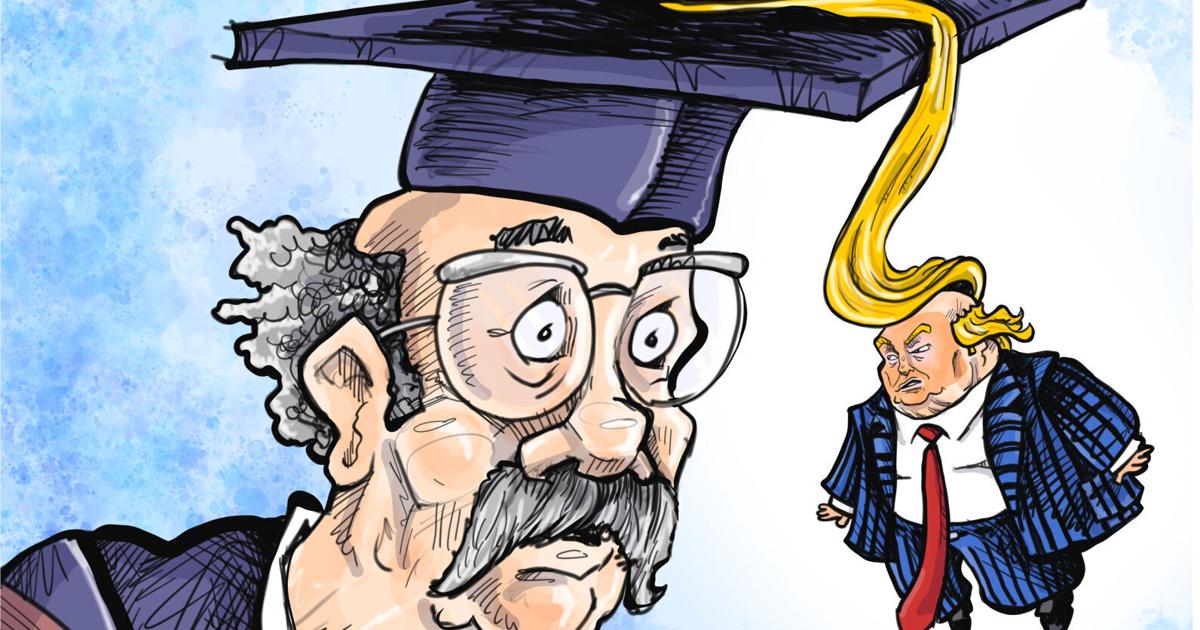Politics
Trump’s Federal Compact Proposal Threatens University Autonomy

President Donald Trump has proposed a controversial federal “compact” that would require some of the most prestigious universities in the United States to adhere to specific guidelines regarding free speech and campus policies. This initiative has raised significant concerns among educators and administrators, who fear it could undermine academic freedom and institutional autonomy.
The proposed compact aims to enforce a set of principles that would govern how universities handle free speech, diversity, and inclusion initiatives. Critics argue that this directive represents an overreach of federal authority into the operations of educational institutions, potentially restricting their ability to foster a diverse and inclusive environment. Many believe that such a compact could lead to a chilling effect on academic discourse.
Concerns Over Academic Freedom
Many university leaders have expressed alarm over Trump’s push for this compact. The American Council on Education, which represents numerous higher education institutions, stated that the proposal could interfere with the essential mission of universities to explore complex ideas and engage in open dialogue. Furthermore, educators fear that compliance with federal mandates could lead to a homogenization of thought on campuses, stifling innovation and critical analysis.
James Rosen, a former political reporter and Pentagon correspondent, has highlighted the potential ramifications of this policy in his recent commentary for InsideSources.com. He emphasizes that imposing federal standards may not only threaten the independence of universities but could also hinder their ability to attract diverse faculty and students.
The compact is seen by some as a response to ongoing debates regarding political correctness and free speech on campuses, issues that have become increasingly polarizing in American society. Observers suggest that by framing this initiative as a matter of free expression, Trump may be attempting to consolidate support among certain voter demographics ahead of the upcoming elections.
Implications for Higher Education
If implemented, this compact could have far-reaching consequences for funding and grants. Universities that refuse to comply with the federal guidelines might face financial penalties, impacting their operational budgets and research capabilities. This potential loss of funding could jeopardize numerous academic programs and initiatives that rely heavily on federal support.
Moreover, critics argue that this move could set a precedent for further federal intrusion into higher education, raising questions about the long-term implications for university governance. The autonomy of educational institutions has been a cornerstone of American higher education, and any shift towards increased federal control could fundamentally alter the landscape.
The debate surrounding Trump’s proposal reflects broader societal tensions regarding the role of universities in shaping public discourse. As institutions grapple with these challenges, the outcome of this compact could define the future of higher education in the United States.
In conclusion, the proposed federal compact by Donald Trump has sparked intense discussions about academic freedom and federal oversight. As universities stand at a critical juncture, the repercussions of this initiative will likely reverberate through the educational landscape for years to come.
-

 Science2 months ago
Science2 months agoInventor Achieves Breakthrough with 2 Billion FPS Laser Video
-

 Health2 months ago
Health2 months agoCommunity Unites for 7th Annual Into the Light Walk for Mental Health
-

 Top Stories2 months ago
Top Stories2 months agoCharlie Sheen’s New Romance: ‘Glowing’ with Younger Partner
-

 Entertainment2 months ago
Entertainment2 months agoDua Lipa Aces GCSE Spanish, Sparks Super Bowl Buzz with Fans
-

 Health2 months ago
Health2 months agoCurium Group, PeptiDream, and PDRadiopharma Launch Key Cancer Trial
-

 Top Stories2 months ago
Top Stories2 months agoFormer Mozilla CMO Launches AI-Driven Cannabis Cocktail Brand Fast
-

 Entertainment2 months ago
Entertainment2 months agoMother Fights to Reunite with Children After Kidnapping in New Drama
-

 World2 months ago
World2 months agoIsrael Reopens Rafah Crossing After Hostage Remains Returned
-

 Business2 months ago
Business2 months agoTyler Technologies Set to Reveal Q3 Earnings on October 22
-

 World2 months ago
World2 months agoR&B Icon D’Angelo Dies at 51, Leaving Lasting Legacy
-

 Health2 months ago
Health2 months agoNorth Carolina’s Biotech Boom: Billions in New Investments
-

 Health2 months ago
Health2 months agoYouTube Launches New Mental Health Tools for Teen Users









